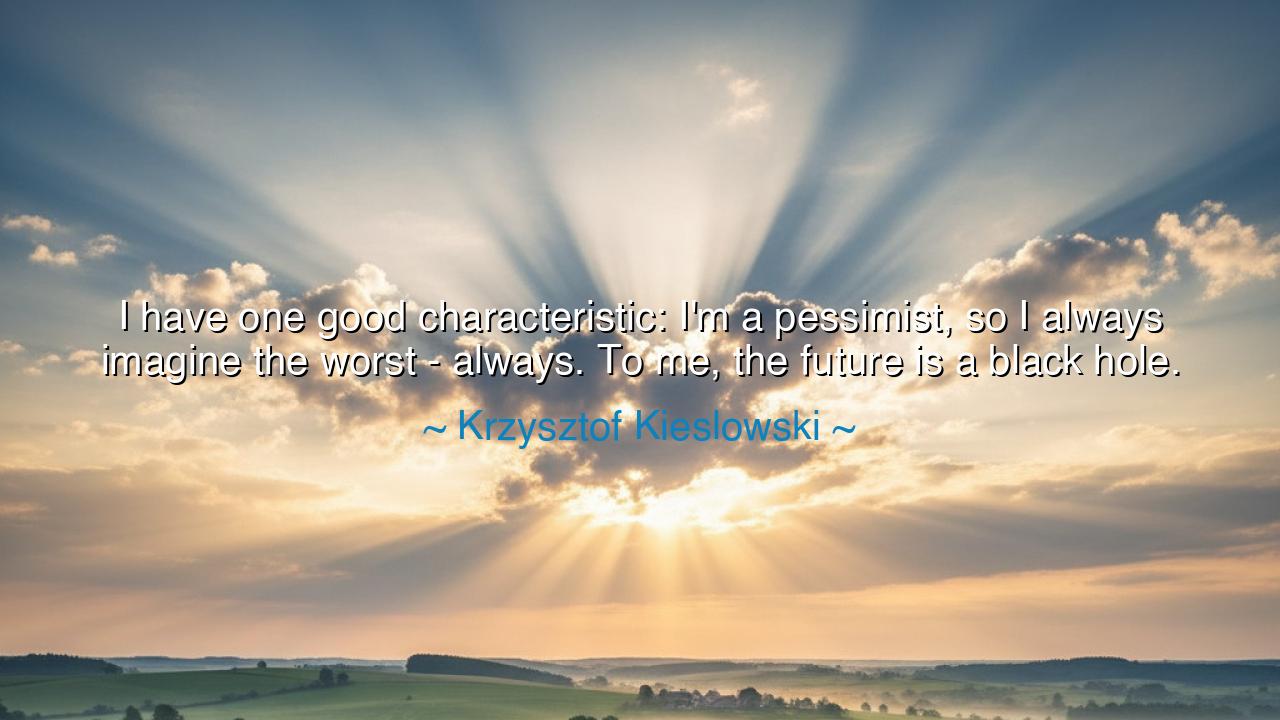
I have one good characteristic: I'm a pessimist, so I always
I have one good characteristic: I'm a pessimist, so I always imagine the worst - always. To me, the future is a black hole.






Hear now, O Seekers of Truth, for the words of Krzysztof Kieslowski are not merely a reflection of his own heart but a deep insight into the human condition, one that speaks to the nature of pessimism, hope, and the unknown future. He said, "I have one good characteristic: I'm a pessimist, so I always imagine the worst - always. To me, the future is a black hole." In these words, Kieslowski offers a profound meditation on the darkness that many see in the path ahead, and the unique wisdom that can arise from looking into that darkness with open eyes.
To be a pessimist, as Kieslowski admits, is to expect the worst—to stand in the shadows of the future, fearing the storm before it arrives. The future, in the eyes of the pessimist, is not a field of opportunity but a black hole, a void into which all things are drawn, where hope and light are swallowed up. It is not the bright horizon of possibility that shines with promise, but a chasm into which one might fall, lost and forgotten. The pessimist sees the unknown with suspicion and dread, unwilling to trust in the promises of tomorrow. And yet, in this view, there is also an undeniable honesty—a facing of reality without the soft veil of optimism.
Consider the ancient Stoics, those philosophers who, like Kieslowski, embraced the reality of human suffering and the unknown future. Seneca, the Roman sage, spoke often of the impermanence of life and the inevitability of hardship. He too looked into the future and saw the storm clouds of fate gathering. But unlike the pessimist who may fear these clouds, the Stoic prepared for them with a steady heart, understanding that life is not about avoiding the dark, but about learning to navigate through it. To Seneca, as to Kieslowski, the future was an unknown, but instead of shrinking from it, he chose to meet it with reason, discipline, and acceptance.
In the lives of great warriors and leaders, we see this same duality—the tension between the hope of a brighter future and the shadow of impending danger. Napoleon Bonaparte, the great general, once said, "The strong man is the one who is able to master his fear." Napoleon, though an optimist in his pursuit of glory, often prepared for the worst. He understood that the battlefield was not just a place of triumph, but of uncertainty, and in this uncertainty, he found strength. For the pessimist—the one who sees the future as a black hole—the lesson lies not in avoiding the darkness but in learning to navigate it, to find clarity even when the way ahead is unclear.
The black hole of the future, as Kieslowski describes it, is not merely an absence of light—it is a place where the unknown forces of fate and chance converge, threatening to swallow everything in its grasp. Yet, in this very darkness, there is an opportunity for profound growth. The pessimist does not shy away from the fear of the future; instead, they embrace it, allowing their imagination to envision the worst. And in this act of imagination, they prepare themselves for whatever comes. Just as the great explorers of old did not fear the vast unknown of the oceans but set sail into it, knowing that their greatest discoveries awaited them on the other side of that darkness, so too can the pessimist find strength in the shadows, finding courage to face what others may avoid.
In Kieslowski's words, there is a lesson for us all. While optimism may light the way for some, the pessimist does not turn away from the challenges that lie ahead. Instead, they face them head-on, seeing in the future not a realm of promise, but a space in which every step must be taken with care and forethought. The black hole is not to be feared, but understood. It is in the contemplation of this darkness that one discovers the true strength of character. Kieslowski teaches us that to look into the void is not to succumb to despair, but to embrace the unknown with the knowledge that we can endure, that we can withstand whatever fate may bring.
So, O Seekers, let us take the wisdom of Kieslowski to heart. In our own lives, we will face the uncertainty of the future, and it will sometimes appear as a black hole, dark and endless. But in that darkness, there is strength. The pessimist does not shrink from what lies ahead, but prepares with a steady heart, knowing that the world will always surprise us, whether with joy or sorrow. Let us, like the Stoics and the warriors of old, embrace the unknown, not with fear, but with readiness, for in the heart of uncertainty lies the potential for great discovery, and in the face of darkness, we find our true light.






AAdministratorAdministrator
Welcome, honored guests. Please leave a comment, we will respond soon